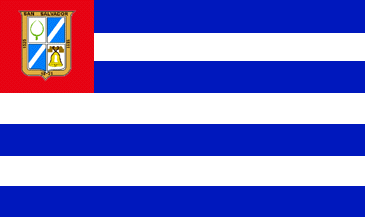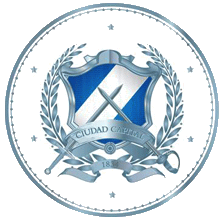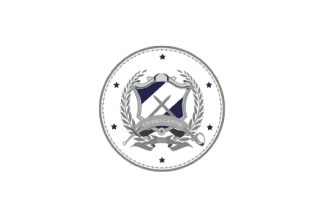 image by Fred Drews and Jaume Ollé, 18 August 1999
image by Fred Drews and Jaume Ollé, 18 August 1999
Last modified: 2024-08-24 by daniel rentería
Keywords: san salvador | el salvador |
Links: FOTW homepage |
search |
disclaimer and copyright |
write us |
mirrors
 image by Fred Drews and Jaume Ollé, 18 August 1999
image by Fred Drews and Jaume Ollé, 18 August 1999
See also:
San Salvador, the capital of San Salvador Department, uses the
same flag and the coat of arms as the department flag and coat of
arms.
Fred Drews, 18 November 2004
The municipal symbols of El Salvador are shown and described
on a dedicated
page of the municipal website.
The municipal flag of San Salvador is horizontally divided in
seven stripes, blue-white-blue-white-blue-white-blue, with a
square red canton (height: three stripes) charged with the
municipal coat of arms. The flag was approved in 1943 by the
Municipal Council presided by José María Melara.
The municipal coat of arms, approved after a contest launched in
1943, was designed by the painter José Mejía Vides. The shield
is "Quarterly, 1. Argent a chain of emeralds, 2. and 3.
Azure a bend sinister argent, 4. Argent a bell proper."
The chain of emeralds represents Cuscatlán [Cuscatlán, today
the name of a department of El Salvador, was the name given to
the natives of the western part of the country, lit. meaning
"Land of the Precious Jewels". I.S.], while the bell
belongs to the Church of Mercy, used by Priest José Matías
Delgado [José Matías Delgado y León (1767-1832), priest and
doctor, is nicknamed "The Father of the Salvadorian
Fatherland". On 5 November 1811, he is said to have rung the
bells of the Church of Mercy in El Salvador as a cry for freedom.
Delgado was President of El Salvador from 1821 to 1823.I.S.] to
give the signal of the insurrection for the independence of the
country. The second and three quarters are an oblique projection
of the colours of the antique Federal Flag.
The dates on the border of the shield are 1525 [The town of San
Salvador was founded in April 1525 by the Spaniards, in a place
located south of the today's town; destroyed by the natives in
1526, the town was refunded in 1528 near Suchitoto, north of San
Salvador, and, for the third and last time, in 1525, on its
today's site.I.S], the year of foundation of the town; 1811, the
year of the first uprising for independence; and 1821 [On 15
September 1821, the provinces of Central America, including El
Salvador, declared their independence from Spain.I.S], the year
of the proclamation of independence.
The design of the flag recalls, probably not by a mere
coincidence, the striped flag (but
with nine stripes) with a red canton used by El Salvador in the
late 19th century - early 20th century.
Ivan Sache, 25 February 2009
2018
15.gif) image by Fred Drews,
9 September 2018
image by Fred Drews,
9 September 2018
On May 1st the original coat or arms and flag of the city, which were
substituted by new emblems three years ago, were reinstated.
Fred Drews,
9 September 2018
2015
 image by Fred Drews, 15 May 2015
image by Fred Drews, 15 May 2015
Modified Coat of arms city of San Salvador, department of San Salvador, El
Salvador.
After a week the new city of San Salvador coat of arms, has had a few modifications made to it.
Fred Drews, 15 May 2015
15-2015.gif) image by Fred Drews, 06 May 2015
image by Fred Drews, 06 May 2015
Coat of arms city of San Salvador, department of San Salvador. As of today
the coat of arms of the capital city of San Salvador has changed.
Fred Drews, 06 May 2015
Previous Coats of Arms
ss.jpg) image from
www.guanaquin.com
image from
www.guanaquin.com
ss43.gif) image contributed by Fred Drews, 28 August 2009
image contributed by Fred Drews, 28 August 2009
This is the old Coat of arms for the city of San
Salvador, the capital of El Salvador, which was used before
1943, when it was substituted by the current coat of arms. This
old Coat of arms was based on the original coat of arms given by
the King of Spain to San Salvador in the late 1500s, the main
difference are the dates that were added to the original
emblem.
Fred Drews, 28 August 2009
 image by Fred Drews, 01 December 2015
image by Fred Drews, 01 December 2015
Flag of the Government of the city of San Salvador (Gobierno de San
Salvador), department of San Salvador.
Fred Drews, 01 December 2015
Much less a government
flag, it is more a replacement of the flag of the city of San Salvador. This
flag was used only during the tenure of Nayib Bukele (2015–2018) as the mayor of
the district of San Salvador. The symbolism it carries is very similar to the
current flag of its municipality. On its coat of arms, the diagonal flag
symbolizes loyalty, protection and the obligation to serve. 1834, the date when
San Salvador was declared the capital of the Federal Republic of Central
America, is on a ribbon below the ribbon reading "CIUDAD CAPITAL" (meaning
Capital City). The swords symbolize the struggle and blood shed by General
Francisco Morazán and Captain General Gerardo Barrios, "heroes who established
the Republic and the legacy left to new generations." The six stars surrounding
the shield are for the six districts (keep in mind district does not have the
same meaning as it does now; today the meaning is zones). The coat of arms also
features a laurel wreath. Indoor versions of the flag also carry a gray fringe.
The flag fell out of use when it reverted to the old one on May 1, 2018, when
ARENA was reinstated into the municipality's government.
Source:
https://www.elmetropolitanodigital.com/2015/05/alcaldia-de-san-salvador-tiene-un-nuevo-escudo/
Daniel Rentería, 5 July 2024
 image located by Daniel Rentería, 5 July 2024
image located by Daniel Rentería, 5 July 2024
.gif) image located by Daniel Rentería, 5 July 2024
image located by Daniel Rentería, 5 July 2024
The symbols of San Salvador adopted
during the tenure of Nayib Bukele were re-adopted on May 1, 2021; the day Mayor
Mario Durán (of Nuevas Ideas, Bukele's party) came into office. However, on the
coat of arms, one difference is noted: the shade of blue. During the tenure of
Bukele, the coat of arms was light blue. However, the tenure of Durán saw the
color being changed to dark blue, probably as preference. The color of the
flag's field also changed from blue to white. Again, the fringe on flags used
indoors is gray. Apparently, the coat of arms was approved by municipal decree
on May 5. The symbolism of the diagonal flag and and shield as decreed is kept
the same; however, the decree gives the symbolism of the laurel wreath as:
"...surrounded by a wreath of laurels, which are intertwined around the banner,
representing triumph and rebirth." The symbolism of the color silver is kept on
the current flag.
Source:
https://www.laprensagrafica.com/elsalvador/Nueva-administracion-de-alcaldia-capitalina-regresa-a-la-bandera-y-escudo-que-uso-Bukele-mientras-fue-alcalde-20210501-0015.html
Daniel Rentería, 5 July 2024